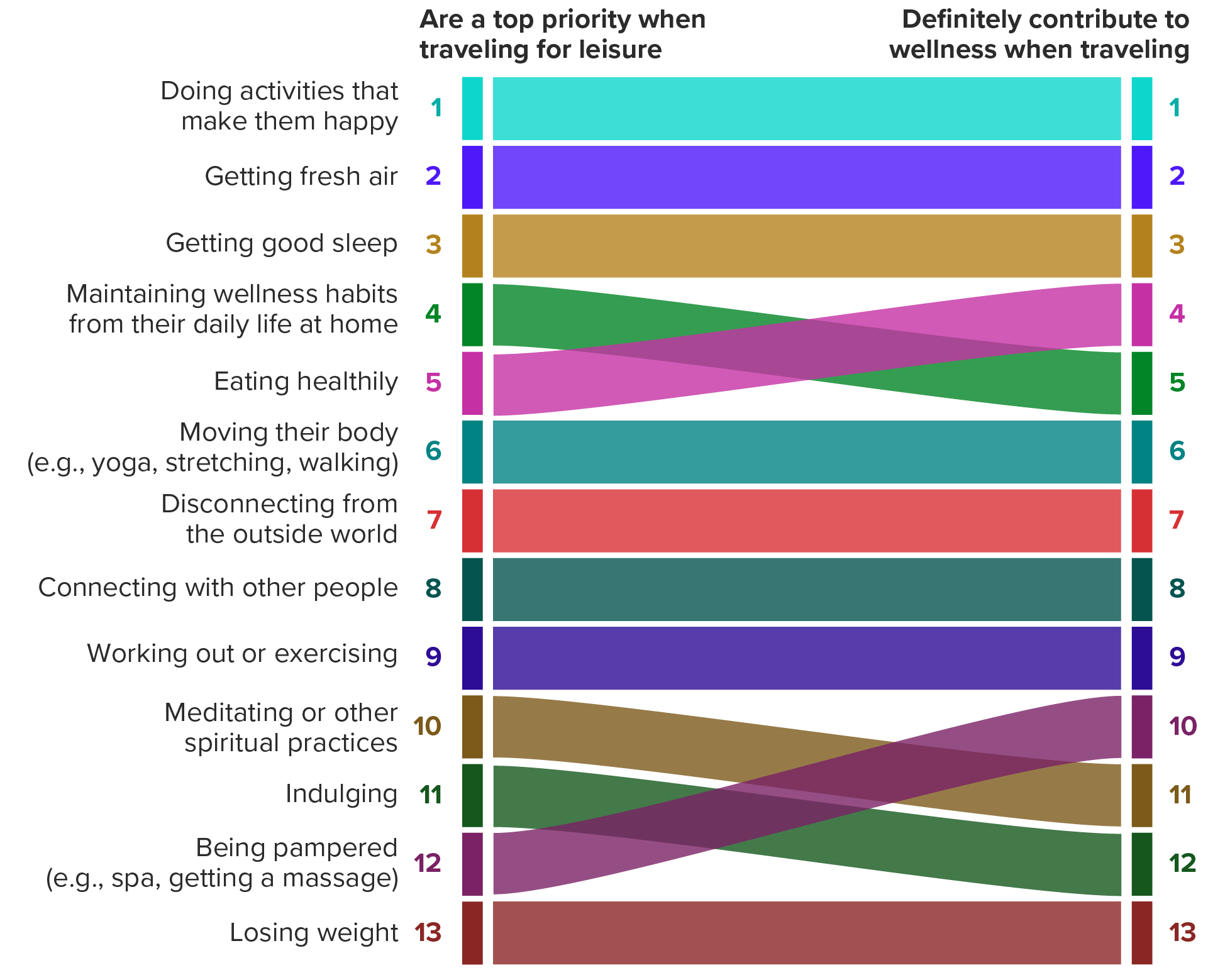When It Comes to Wellness Travel, Brands Must Think Outside the Detox

Key Takeaways
A vast majority of consumers — 78% — say wellness is a priority when they travel for leisure.
For most travelers, wellness is simply a component of their trip, but that doesn’t mean they aren’t willing to spend big on it.
Activities that travelers most associate with wellness tend to be simple pleasures like fresh air and good sleep, meaning there is broad opportunity for brands to engage.
For a daily briefing on the most important data, charts and insights from Morning Consult, sign up for Our Best Intel.
Spa retreats. Sunset meditations. Smoothie bowls. Wellness travel often evokes imagery of a high-end, exclusive holistic getaway, only accessible to the most affluent of consumers. But in reality, travelers have a much broader definition of what it means to pursue wellness during a trip, and they’re more likely to want to integrate wellness-related activities into their leisure travel than to take a vacation that specifically centers on wellness. As a result, the group engaging in this growing trend extends far beyond the stereotype.
Understandably, this is a category in which travel brands are eager to participate. The Global Wellness Institute anticipates that the global wellness economy will reach $7 trillion in 2025, with wellness tourism making up more than $1.1 trillion. Based on this popularity and the variety of activities consumers are eager to engage in, there’s space for all travel companies to take part.
Wellness travel has broad appeal
As an overall concept, wellness — defined by most consumers as some combination of physical, mental and emotional health — has been gaining traction for more than a decade. While the size of the wellness market was dinged by COVID-19, consumers emerged from the pandemic with a greater desire to prioritize their well-being, leading experts to predict even more growth in the category. To wit, the vast majority of consumers — 92% — said that wellness is a priority in their daily lives. A smaller but still sizable share — 78% — said wellness is a priority when they’re traveling for leisure.
Consumers themselves noted a shift in the way they prioritize wellness in travel since the COVID-19 pandemic upended lifestyles and brought many health-related questions to the fore. A full third of U.S. adults said they care more about wellness while traveling now than they did prior to the pandemic. And interest continues to grow — 27% of consumers said they care more about wellness when traveling for leisure now than they did last year.
Notably, the demographic skews among those who said they prioritize wellness in travel are not massive. Gen Zers and lower-income consumers were slightly less likely to say they do so, but that correlates with both groups’ lower tendency to prioritize wellness in daily life, meaning this is a lifestyle rather than a travel preference.
As a result, many travelers are purposefully incorporating wellness activities into their trips: 58% said they plan these types of activities when traveling for leisure, with millennials, higher-income consumers and parents the most likely to do so.
Most travelers are willing to pay for wellness activities, even if it’s only part of their vacation
Travelers don’t need to dedicate an entire trip to the pursuit of wellness to feel like they’re engaging. Only 15% of U.S. adults said their next trip will be primarily focused on wellness. However, nearly half of consumers (46%) said they’ll incorporate some activities to improve their well-being into their upcoming leisure travel plans, but it won’t be the main purpose of the trip.
Given this approach, the majority of travelers said it’s easy to integrate wellness into their leisure travel plans — 28% said it’s “very easy,” and 49% said it’s “somewhat easy.” Even among those who said it’s difficult, many will do so anyway, highlighting an opportunity for travel brands to ease the burden for this group. Wellness, after all, is defined by many as being mentally and emotionally healthy — in other words, stress-free.

Just because wellness isn’t the core driver of most travelers’ plans doesn’t mean they’re not planning on spending on wellness-centric activities. Among those with travel plans, 84% said they will spend at least something on wellness activities. Moreover, 70% said they will spend $100 or more, and 13% said they will spend at least $500. Level of spending is where more substantial demographic differences show — 1 in 5 travelers in the highest-earning households plan to spend $500 or more, compared with around 1 in 10 low-income travelers. Urbanites and parents are also more likely to splash out on wellness activities, with 17% and 18%, respectively, saying they’ll spend more than $500.
For travelers, wellness tourism means more than massages and meditation
The ease travelers feel in incorporating wellness into their plans is likely because the activities they want to engage in when traveling are also the things they perceive to contribute to overall well-being. Ranked in order of importance, the things travelers cited as top priorities during leisure travel are doing activities that make them happy, getting fresh air and getting good sleep. These are also the top three things that travelers said contribute to their wellness in general while traveling.
Differences in the full rank orders are minor — only “being pampered” differed by more than one rank position on travelers’ priority lists. Overall, the activities that people prioritize on trips align closely with their perceptions of what supports their health and well-being.

These rankings upend the traditional perceptions of wellness travel. From working out to getting pampered to meditating, stereotypical wellness activities fall toward the bottom of the list of things travelers actually want to do, and also the list of things they see as supporting their overall well-being. In reality, the wellness activities they prioritize are much simpler and more attainable. This mindset is the key contributor to the broad appeal of wellness in leisure travel and also suggests that all travel brands have the potential to deliver goods and services that meet consumers’ wellness expectations.
This means the travel companies that have subscribed to more traditional views of wellness tourism, focusing on features or benefits that support lower-priority activities like being pampered, meditating or even disconnecting, are missing the larger picture. While those things are certainly important, there is a bigger job to be done by travel brands. Those that can support simpler needs of small pleasures, fresh air and good sleep are truly catering to their customers’ desire for wellness.
Lindsey Roeschke is an analyst whose work focuses on behavior and expectations of consumers in the travel & hospitality and food & beverage categories, particularly through a generational and cultural lens. Prior to joining Morning Consult, she served as a director of consumer and culture analysis at Gartner. In addition to her research and advisory background, Lindsey has more than a decade of experience in the advertising world. She has lived and worked in seven cities across four continents.